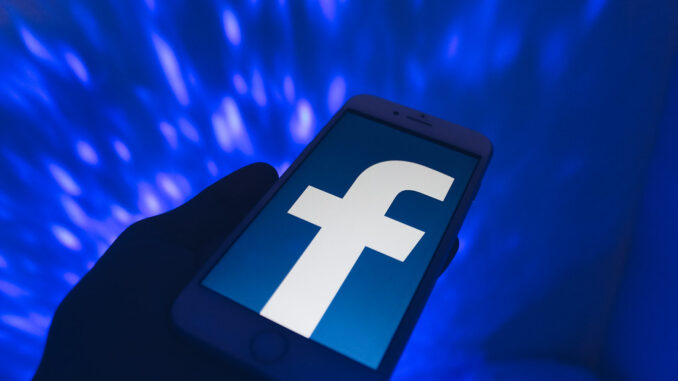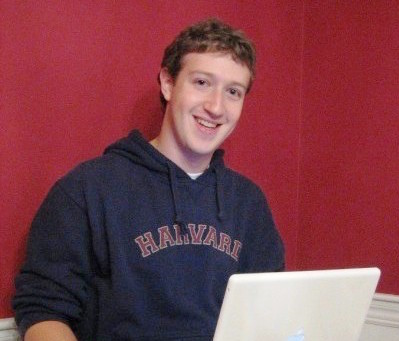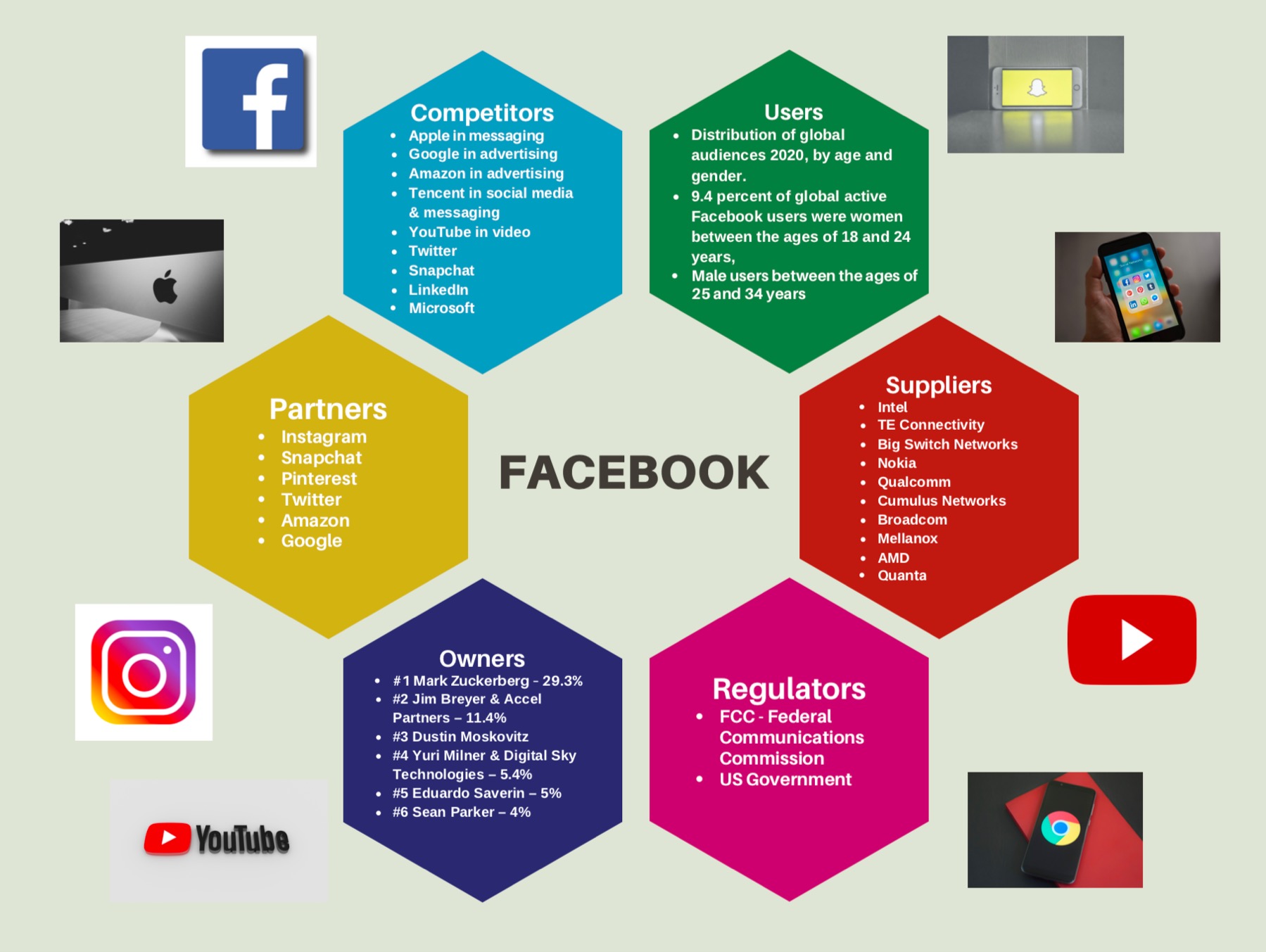
Introduction
Facebook is a social media and social networking site, which allow users to connect and share information with family and friends online. It owns over a billion users and has had transformed the traditional way of online communication and online business models. With the combination of developed digital communication tools, which makes lead to an easier access of communication networks; lower cost broadband network; increased application features (Soukup, 2018), Facebook has a significant transformative impact on the internet and the economic, political, and social world.
This essay will critically analyse the transformative impacts of Facebook. It will firstly outline a brief description of what Facebook is and its history of development, secondly provide analysis of its business model, thirdly analyse Facebook’s industrial ecology, and finally a discussion of its transformative impacts through the perspectives of society, economy and politics.
What Is Facebook?
 Image: “facebook” by pshab is licensed under CC BY-NC 2.0
Image: “facebook” by pshab is licensed under CC BY-NC 2.0
Facebook has more than 1 billion users worldwide, it is the world’s largest social networking platform. The products of Facebook shared over 100 billion messages every day and empower users to share ideas through the platform. The company have its own culture that keep constantly iterating in order to “solving problems and working together to connect people all over the world” (Facebook, 2018b). This California based company was founded by Mark Zuckerberg and his fellow students (include Dustin Moskovitz, Chris Hughes, and Eduardo Saverin) during he enrolled at Harvard University in 2004 (Soukup, 2018). Facebook allow people to send messages and post status updates to others and can also share different types of contents include images and links.
The video below is helpful to a better understanding about Facebook.
As a platform of sharing information, Facebook connect people with their family, friends, and others who they study and works together, this ability of strong connection and timely and effective information sharing make Facebook unique and outstanding. Transformative impact that Facebook has brought can be discussed in both sides of positive and negative, which will be identify detailly in the last part of this essay.
Historical Background of Facebook
As what Kuhikar (2013) have noted in the article, the original intention of Facebook was to create a college directory which is used to connect and share information among students in Harvard University. At the beginning, the college directory is only available between students who have register as members, with a gradually extension of numbers of people and the joint of Dustin Moskovitz, Chris Hughes, and Eduardo Saverin, the initial founder team was formed. After a school-wide promotion and use, Facebook gradually expanded to students from Boston and Stanford University, and finally to anyone who are over 13 years old with a valid email address (Kuhikar, 2013). The college directory was officially becoming Facebook.com in August 2005 after the address was purchased for 200,000 dollars (Phillips, 2007).
 Image: “File:MarkZuckerberg-crop.jpg” by Elaine Chan and Priscilla Chan is licensed under CC BY 2.5
Image: “File:MarkZuckerberg-crop.jpg” by Elaine Chan and Priscilla Chan is licensed under CC BY 2.5
Facebook.com started making profit through advertising revenue since 2006 after it has extended to registered email address that beyond educational institutions (Phillips, 2007). In the same year, Mark Zuckerberg refused a $1 billion acquisition offer from Yahoo with a reason of Yahoo undervalued Facebook’s potential (Greiner, Fiegerman, Sherman & Baker, 2019). In the following six years, Facebook experienced a rapid growth after Microsoft’s $240 million investment (purchases a 1.6% share of Facebook). Since then, Facebook has focused on network development, AI (artificial intelligence) and virtual reality development, as well as the acquisition of small companies of the same type for example Instagram and WhatsApp.
CNN Business (2019) provide a detailed development history of Facebook on the website with the title Facebook at 15: How A Collage Experiment Changed the World. The image below is a timeline which provided on Facebook’s Official Website, it shows significant merge include Instagram and WhatsApp with the year.

Image: Screenshot of Facebook’s History from the official website, taken by the Author November 2020.
Facebook’s Business Model
As a leader in social media revolution, Facebook provide varies products and services, including products of Facebook, Instagram, WhatsApp, Oculus; and services of Facebook Marketplace, Facebook Media, Facebook Messenger, Facebook Ads, Facebook Watch, Facebook Games, Facebook Local and Facebook Business. Competitors of Facebook include but not limited to Apple (in messaging), Google (in advertising), Amazon (in advertising), Tencent (in social media and messaging), YouTube (in video) and Microsoft. The majority revenue of Facebook comes from an advertising business model (Cuofano, 2018). Zuckerberg (2019) stated about Facebook’s business model that Facebook aims to understand users’ interest of advertisement, in order to provide users relevant ads, and online advertising can make targeting more specific and therefore offer more-relevant ads to users.
The video below shows an interview of Mark Zuckerberg talking about how Facebook become a business:
As Cuofano (2018) noted, over 98% of Facebook’s revenue come from target advertising, which primarily consists of displaying advertisement of products on their main social media platform such as Facebook, Instagram and Messenger. The other 2% of total revenues mainly come from payments and other fees. There are three main costumers of Facebook, the first group refers to general users, who use Facebook as a platform to communicate and share ideas with others. The second customer group refers to advertisers and marketers, who create most of Facebook’s revenue through placing offers and promotional advertisements. Using Facebook for branding can provides a combination between direct public relations and marketing or advertising and therefore promote users’ identification with the brand (Soukup, 2018). The third costumer group is developers who develop apps and games for Facebook since the company has its own development platforms. Facebook’s advertising revenue are made up of ‘Self-Serve Advertising’ and ‘Engagement Ads’ which refer to small advertisement from individual and large advertising in the home page from brands respectively (Business Strategy Hub, 2019).
The video below shows Facebook key numbers for 2017:
Facebook’s Internet Ecology
As Looi (2001) noted that, Internet ecology refers to the interactions and relationships between different actors in the system. Facebook, as the largest social media platform based on social network, its Internet ecology includes competitors, partners, users, suppliers, owners and regulators. Due to the interconnected nature of the Internet industry, many companies maintain the relationship of both partners and competitors such as Facebook with Google Amazon and Twitter.
The diagram below shows Facebook’s Internet Ecology:

Facebook’s Transformative Impact
Social and Cultural Changes
Facebook make big transformation in interpersonal communication and therefore change people’s social life. Research illustrated that Facebook as a technology aided social network contributes different types of interpersonal relationships including identity, interpersonal relationships, friendship, romance or family relationships (Soukup, 2018). Facebook also make communication more convenient. As Cava (2014) reported, Facebook broke people out of the control of email and create a new social medium. As a social network global wide, Facebook build intercultural communication through users with different culture (Soukup, 2018).
However, Soukup (2018) also argued that Facebook also have negative impacts in social and cultural aspects. On the one hand, Facebook can rise negative emotions such as jealousy. On the other hand, due to the virtual identity, people are easily to behave badly without costs, which might result in issues such as cyber violence.
Economic Impact – The ‘Platform Economy’
The term platform economy is also known as ‘Sharing economy’, which refers to digital activities in business, politics, and social interaction (Kenney& Zysman, 2016). As digital platform economy is emerging, companies like Facebook are creating online structures and create value in the economy and also create a new business model. With increasing data and information exchange on Facebook, a concept of Data dividend appeared, which refers to get paid for a percentage of profit from data which are generated to these companies. It can bring benefit to large technology companies through greater incentive for users to share information (Barber, 2018).
Facebook gradually make users contribute to a form of “user labor” through continuously providing data and privacy on the platform. As more time and information is published on Facebook, more data is generated to advertisers as a commodity (Fuchs, 2014), which create a new industry chain of platform economy.
Political Impact
Facebook has significant transformative impact to society in political aspect. Social media facilitate the circulation of political information and provide a platform for users to open up and express their political views (Lee, Lane & Nojin, 2020). Recording and sharing lives of users and therefore strengthen social relationships are the main functions of Facebook, which make users actively associate their political views with their social life (Lee, Lane & Nojin, 2020). Facebook make people closer to political society through an opening dialogue.
However, according to the research of Lee, Lane & Nojin (2020), a term about “spillover effect” is built, which refers to the increased likelihood encounter diverse political views for users due to the variety online social contexts. The platform can be used calling for fascism, separatism and xenophobia after optimized (Brand, 2020), but can also reinforce narratives of opposites and expose vulnerable users to virulent ideologies (Brooking, 2016).
 Image: “Facebook vote counter 0940” by cellanr is licensed under CC BY-SA 2.0
Image: “Facebook vote counter 0940” by cellanr is licensed under CC BY-SA 2.0
Facebook also closely linked with many political activities. The connection between Facebook and the U.S. election is a good example to show how Facebook make changes in the political society. David, Zhitomirsky-Geffet, Koppel, & Uzan (2016) provide an argument about how Facebook classify personal pages to analysis users’ political tendencies, therefore provide political parties a platform for self-presentation to attract their potential voters. The New York Times reported about Facebook use fake accounts to identifies active political influence campaign.
Big Data Surveillance
 Image: “Data Security Breach” by Visual Content is licensed under CC BY 2.0
Image: “Data Security Breach” by Visual Content is licensed under CC BY 2.0
Data surveillance refers to the use of data to estimate specific problems. Facebook’s large user base provide government opportunity to use data analytics in planning and targeting government services and spending better and efficiently (Groggin et al., 2017). However, while data surveillance brought many benefits to society, concerned of Data surveillance and privacy is also pointed out. Facebook’s feature of “Likes” is a channel to share and sell data for commercial and marketing purposes, because big data evaluation mechanism can use it to predict consumers’ reactions and influence their decisions (Mosco, 2014). Morozov (2013) stated that users are unknowingly disclosing their privacy when they use mobile phones to log in social media sites.
Conclusion
To sum up, Facebook is the world’s largest social media platforms who owns more than 1 billion users worldwide. The company have experienced a rapid development from a college directory which founded by Mark Zuckerberg, and mainly make profit through publishing advertisement. Facebook make significant transformative impact on society, include change people’s social life in social and cultural level, developing ‘platform economy’ in economic level, make people closer to political society through an opening dialogue and built notable issue in digital media landscape about big data surveillance and privacy protection. Facebook is a significant part in digital media landscape.
Reference List
Barber, G. (2018). Here’s How Much Money You Can Make by Selling Your Own Data Wired.Com. Retrieved from: https://www.wired.com/story/i-sold-my-data-for-crypto
Brand, M. (2020). Facebook is tilting the political playing field more than ever, and it’s no accident. The Conversation. Retrieved from: https://theconversation.com/facebook-is-tilting-the-political-playing-field-more-than-ever-and-its-no-accident-148314
Brooking, E. T., & Singer, P. W. (2016). WAR GOES VIRAL. The Atlantic Monthly, 318(4).
Business Strategy Hub, (2019). Facebook Business Model | How does Facebook make money? Retrieved from: https://bstrategyhub.com/facebook-business-model-how-does-facebook-make-money/
Cava, M. D., (2014). How Facebook changes our lives. USA TODAY. Retrieved from: https://www.usatoday.com/story/tech/2014/02/02/facebook-turns-10-cultural-impact/5063979/
Content Marketing. (2018). What Is Facebook? The Purpose of Facebook. [Video File]. YouTube. Retrieved from: https://www.youtube.com/watch?v=StPGR1URK5A
Cuofano, G. (2018). How Does Facebook Make Money? Facebook Business Model In A Nutshell. FourWeekMBA. Retrieved from: https://fourweekmba.com/how-does-facebook-make-money/#:~:text=Facebook%20makes%20money%20with%20an,%2C%20Messenger%2C%20and%20third%2Dparty
David, E., Zhitomirsky-Geffet, M., Koppel, M., & Uzan, H. (2016). Utilizing facebook pages of the political parties to automatically predict the political orientation of facebook users. Online Information Review, 40(5), 610-623. doi:http://dx.doi.org.ezproxy1.library.usyd.edu.au/10.1108/OIR-09-2015-0308
Facebook. (2018b). Our history. Facebook Official Website. Retrieved from: https://newsroom.fb.com/company-info/
Fuchs, C. (2014). Digital workers of the world unite! A framework for critically theorising and analysing digital labour. TripleC : Communication, Capitalism & Critique. Open Access Journal for a Global Sustainable Information Society, 12(2), 486–563.
Greiner, A., Fiegerman, S., Sherman, I. & Baker, T. (2019). FACEBOOK AT 15:HOW A COLLEGE EXPERIMENT CHANGED THE WORLD. CNN Business. Retrieved from: https://www.cnn.com/interactive/2019/02/business/facebook-history-timeline/index.html
Groggin, G., Vromen, A., Weatherall, K., Martin, F., Webb, A., Sunman, L., & Bailo, F. (2017). In Digital rights in Australia (p. 74). Sydney University Press.
Kenney, M., & Zysman, J. (2016). The rise of the platform economy. Issues in Science and Technology, 32(3), 61-69. Retrieved from http://ezproxy.library.usyd.edu.au/login?url=https://www-proquest-com.ezproxy1.library.usyd.edu.au/docview/1812403520?accountid=14757
Kuhikar, P. (2013). Facebook marketing using facebook pages for indian marketers: An overview. Prima, 4(1) Retrieved from http://ezproxy.library.usyd.edu.au/login?url=https://www-proquest-com.ezproxy1.library.usyd.edu.au/docview/1503489756?accountid=14757
Lee, S. S., Lane, D. S., & Nojin, K. (2020). When social media get political: How perceptions of open-mindedness influence political expression on facebook. Social Media + Society, 6(2) doi:http://dx.doi.org.ezproxy1.library.usyd.edu.au/10.1177/2056305120919382
Looi, C. K. (2001). Enhancing learning ecology on the Internet. Journal of Computer Assisted Learning, 17(1), 13-20.
Morozov, E. (2013). To save everything, click here : The folly of technological solutionism. Retrieved from: ProQuest Ebook Central https://ebookcentral-proquest-com.ezproxy2.library.usyd.edu.au
Mosco, V. (2014). To the cloud: big data in a turbulent world (pp. 15–77). https://doi.org/10.4324/9781315631554
Phillips, S. (2007). A brief history of Facebook. The Guardian. Retrieved from: https://www.theguardian.com/technology/2007/jul/25/media.newmedia
Soukup, P. A., S.J. (2018). Facebook: Changing the face of communication research. Communication Research Trends, 37(1), 3-42. Retrieved from: http://ezproxy.library.usyd.edu.au/login?url=https://www-proquest-com.ezproxy1.library.usyd.edu.au/docview/2025776782?accountid=14757
Zuckerberg, M. (2019). Understanding Facebook’s Business Model. About FB. Retrieved from: https://about.fb.com/news/2019/01/understanding-facebooks-business-model/

